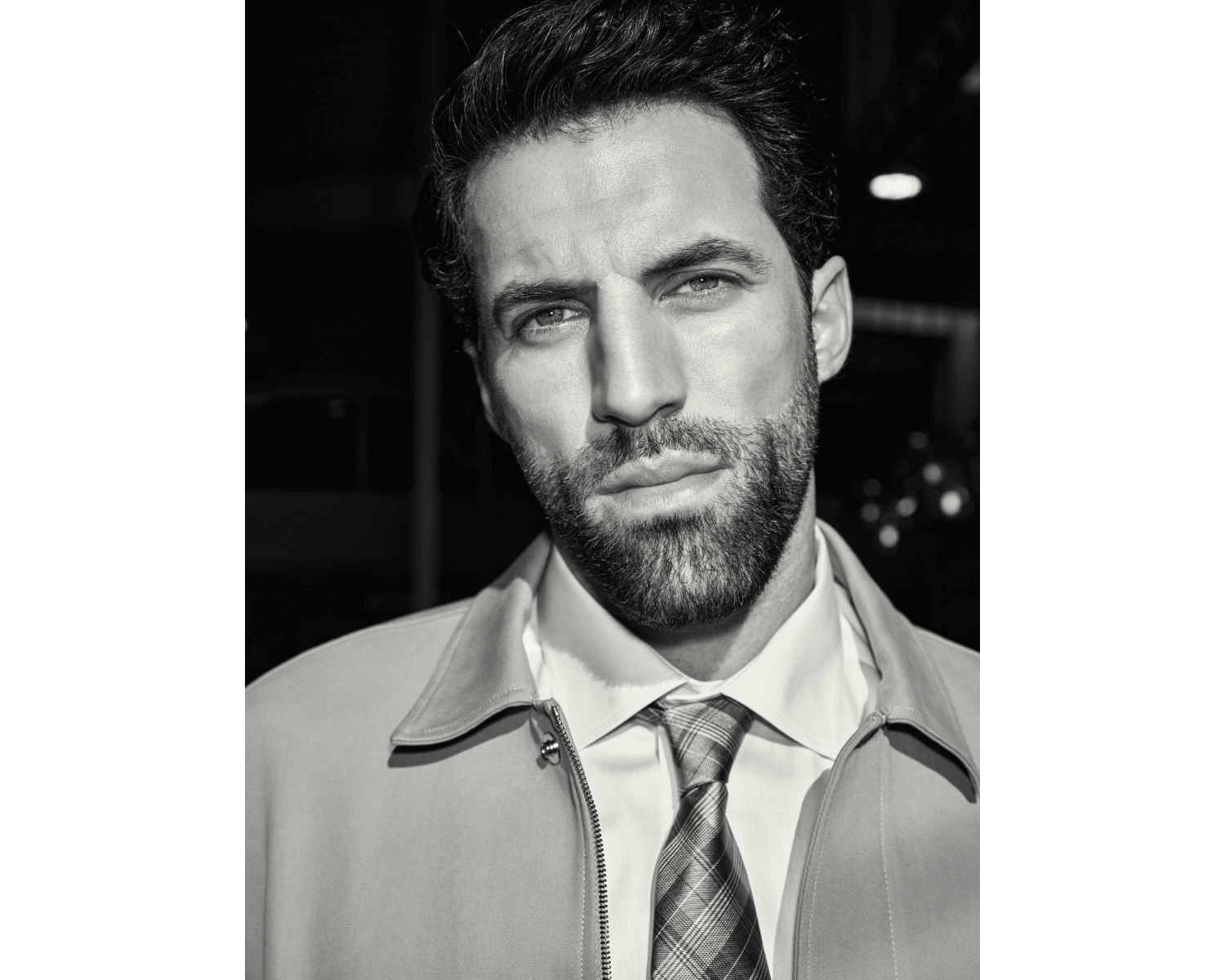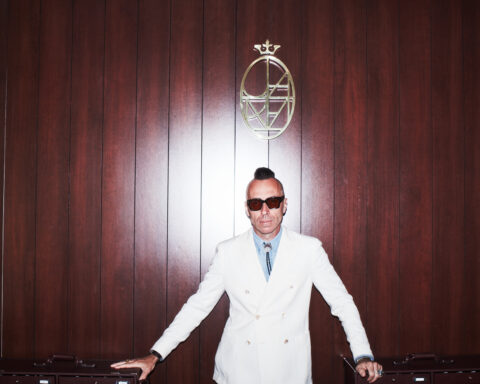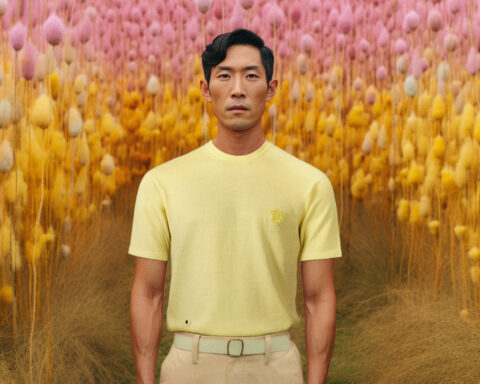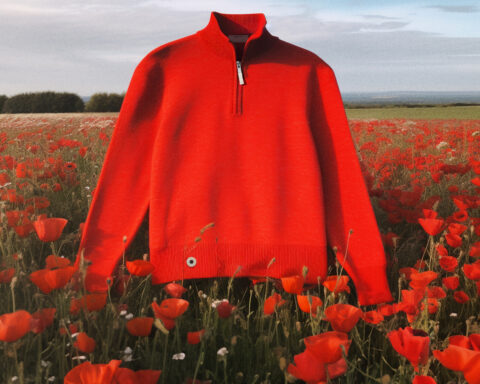It would be hard to find a living athlete who has made a bigger impact on his sport than Paul Rabil.
The 36-year-old retired from playing lacrosse last year, having won three league MVP awards, appeared in 10 straight All-Star games, and is considered by many to be the greatest player in history.
But while many world class sportsmen, from Michael Jordan to Jackie Robinson, left a legacy, and others, like David Beckham, even went on to form their own team, Paul has bestowed the sport he loves a better, and fairer, league.
Along with his brother Mike, Paul co-founded the Premier Lacrosse League in 2019. Their first goal was simply to pay the athletes a reasonable living wage, something most of Paul’s peers had not previously received throughout their careers. Next, they’ve set their sights on becoming one of the top five sports leagues in America, as they raise the profile of the game ahead of an expected Olympic debut in Los Angeles 2028. Central to their mission, and crucial to its potential success, is using storytelling to celebrate lacrosse’s Native American heritage, with the sport previously used by Iroquois tribes to solve conflict and wars.
Paul was followed by TV cameras as he set up his league, a rival to the sport’s previous governing body, Major League Lacrosse, which they would eventually acquire and merge with. The documentary, called ‘Fate of a Sport’ and executive produced by LeBron James, debuts at the Tribeca Festival in June. The film covers the fundraising, talent poaching, and lawsuits encountered on the way to setting up the PLL, including the fledgling league’s battle to survive the pandemic, when they earned plaudits as the first sport to announce the bubble solution to keep their fixtures on track.
“I’ve never been one to identify a problem and then just hope other people fix it,” Paul tells us. “It’s just not in my blood.”
Ahead of the fourth PLL season, beginning on June 4, Paul shares the inspirational story of shooting America’s oldest sport into the present by celebrating its powerful past.

Tell us about the history and appeal of lacrosse for folks who might have some basic knowledge of the sport, but would like to dive a little deeper.
Lacrosse is a Native American game. It was created in the Iroquois [a collection of American Indian tribes] and is the oldest sport in North America. In the Iroquois, they call it ‘the creator’s game’. They believe it was a game given to them from the powers above us, and they play to express their spirituality and their connection to the creator. They also used it hundreds, and potentially thousands, of years ago as a means to resolve conflict, and even war.
In its original form, it would often look like a battlefield, where there would be hundreds of people playing the game at once, with no boundaries, and no clock. So it’s a warriors game, and the version of it that we see today is actually still played and dominated by a lot of Iroquois nationals. One of my close friends Lyle Thompson is a perennial MVP player, and he lives in the Six Nations [the Iroquois confederacy], just outside of Ontario.
When French settlers came over into Montreal, they adopted a version of it into the format we see today. It then made its way from Montreal into New York, and down into Maryland. That’s why New York and Maryland still remain the most densely populated regions of lacrosse players.
But despite growing up in Maryland, I didn’t have access to the game as a young child. I grew up playing basketball, soccer, football, and baseball. I didn’t know the history of lacrosse until I fell in love with the game and researched it, so my original interest in lacrosse came from it being a combination of all my favorite sports. You have the contact of football, the pace and the agility of basketball, the endurance of soccer, the hand-eye coordination of baseball and hockey. But the biggest difference for me is we each own our own stick, and we string it a certain way, and there’s no two sticks among the millions of people in the world that play lacrosse that are the same. And that to me was really special.

That’s very cool, I think a lot of people won’t be aware that the sport has that heritage and depth. How are you incorporating that history into your relatively new venture of building the Premier Lacrosse League?
I wanted to rebuild professional lacrosse, not only to build a business that could appropriately honor the best players in the world, and pay them akin to other pro athletes, but I also felt that through a professional league, you can share the right narration around the game that, to me, is the most connected to North America of any game in the region.
We are storytelling through the live broadcast, where we do land acknowledgements with our athletes, prior to the national anthem, sharing thanks and gratitude to the land that we play on, that was inhabited by people before us. In the US we’re familiar with saying grace before your meal, and we’re saying grace to the land we’re about to play this game on. It’s an expression of gratitude to those who cultivated the land before us, giving us the opportunity to play on it today.
We’re also telling stories of our players and the sport in other ways. If you look at sports that have reached a mainstream audience, that can be done through major motion pictures like ‘The Mighty Ducks’ or ‘Rudy’, or through unscripted content like ‘Hard Knocks’ for the NFL or ‘Drive to Survive’ for Formula 1. So we’re continuing to explore and invest in those impactful narratives. Since starting this process of setting up the PLL in 2018, we have been recording, and we have a documentary film that got into Tribeca called ‘Fate of a Sport’, with LeBron James and Maverick Carter as executive producers.

Reversing a little, tell us a little bit about what it was like for you as a teenager taking a less familiar path with your sporting talent. It can be tempting as a young guy to just follow the crowd. Did you have to be quite blinkered to give your commitment to lacrosse, rather than just playing the sports more of your peers were playing?
I never thought it would be the sport that I would take long into the future. I had a really hard time with it for the first year and a half. I remember wanting to stop playing and just focus on basketball and soccer, which I was better at then, at the age of 12. But my mom made me go to practice until that first season was over, she dragged me kicking and screaming sometimes. And she was right to do so, because it just took a little bit more patience than I had at the time to figure out the technical skill of lacrosse. If you look at really technical sports, they’re not going to have the level of participation of something like soccer, because it’s far more intricate. If I look at my 12-year-old self, the reason we play games is that we want to have fun and to connect with our friends. But often having fun is tied to being good at it. It took me about a season to figure out how to catch and throw, but then I realized I had a pretty well-rounded set of skills that matched really well with lacrosse.
I think that there’s this notion that our passion sits somewhere out in the universe, and we have to go turn over a bunch of rocks until we locate it, and build a career around that passion. Whereas I believe our passion actually lives within us, and our goal is to locate what that skill set is, then develop it. We can all do one, two, or three things really well. And if you find out what those things are that you do really well — whether it’s numbers, business, sports, arts, entertainment, or whatever — you develop that, you become really good at that, and it becomes your passion. Then the better you are at something, the more likely it is that people will seek you out to perform it at a high level. And that’s really fun. So if you’re good with numbers, you might become an accountant, even if that’s not what you envisioned for yourself. But the better you get at solving people’s tax problems, the more likely it is they’re going to pay top dollar, which means you’re going to fly first class and stay in the best hotels, then you’re going to really enjoy being an accountant! So what I figured out at high school was I was really good at this sport, and I was really enjoying it, and building great relationships with people around me, as a result.

So what happens next? How do you go from a promising high school player, to an MVP in the sport, and then launching your own professional league?
I went to three national championships in college, won two of them, had great teammates, great coaches, and then I was drafted number one into Major League Lacrosse. I didn’t know much about pro lacrosse at the time, because it wasn’t on television, and this is pre social media. I was given a $6,000 rookie [annual] wage. And I went, ‘Oh shit.’ I’m gonna have to move back home with my parents, or find another job to supplement that, because I can’t live on $6,000.
And that was the state of professional lacrosse. I played for 10 years, and when social media started in a really big way in 2008, I began building community around lacrosse through storytelling. I was telling fans where I was working out, the type of workouts I was doing, and sharing my reaction before and after games. That helped me get endorsements, and I signed my first endorsement with Under Armor, then I signed with Red Bull. And then I was able to leave a job in commercial real estate that I had to keep the lights on, and just focus on professional lacrosse.
I was more like an action sports athlete, where my primary income sources were endorsements, but I was working my ass off to try to win MVP titles and win championships. Then I played internationally with Team USA, and played in World Championships, and all through that time, I was constantly contemplating what could be better, and how my passion and love for this game could be felt by my peers who didn’t have the endorsements that I did, and by our fans that were showing up the games, which were largely unattended, and with not a lot of commotion. I felt like it was a step back from college, and that bothered me.
I’ve never been one to identify a problem and then just hope other people fix it. It’s just not in my blood. I think it goes back to my Lebanese heritage. My dad’s parents came over from Ellis Island and one of them opened a clothing shop, and the other one opened a cafe. They’re entrepreneurs. So I became really interested in the business of the sport, and my brother and I, who are co-founders of the league, want to take on challenges and be solution-based. We don’t want to be the kind of people who walk past the piece of trash on the ground and don’t pick it up because someone else will.
So that was the spark for me. Pro lacrosse was really in tough shape. Its reputation was damaged and the pro players weren’t being treated as professionals. My first step was to try to learn about the business in the hope that I could gather enough people in the room to try and fix it. So that was about eight years of studying, and then I reached a point in 2016 where my brother and I met with the front office of Major League Lacrosse. We said, ‘Hey, these are some of our ideas and ways that we could potentially work together.’ But nothing came from it. Meanwhile we saw Major League Soccer and UFC on the rise, and the media environment was changing so it was no longer just the big four leagues [MLB, NBA, NFL, and NHL] on broadcast and cable television. So that actually encouraged me further to think there’s room for lacrosse. We wanted to work with MLL, but they kept closing the door on us, so we decided to start the PLL. Our path forward was to say, “Alright, we have a great relationship with the players, we believe in our vision, and we have some really good investors. Let’s go grab 180 of the best players in the world and start again.”

How has it gone since you launched the league, what’s the current state of play?
This is our fourth season. We launched with NBC in 2019, and had a three-year contract with them, and now we’ve struck a deal with ESPN in our fourth year. And we persevered through COVID, and were the first league in North America to announce the bubble solution. I think to problem solve, one of the biggest challenges that people run up against is the vulnerability or the pain of thinking about the worst case scenario. Especially in sports, how many locker rooms have you been in where people are saying, “Don’t talk about losing, we’re not going to lose.” But the best teams have a plan A, B, C, D and E. I remember March 11, 2020, we were in New York City, and the World Health Organization called it a global pandemic. Mike and I knew our upcoming season began in June, and we immediately put together a shared doc with our executives, and started building this tournament model. Having a successful year during the pandemic helped catapult our business. Being the first to announce this bubble solution landed us a spot on the ‘Today’ show, so I was then invited to go on air live, and talk about sports coming back. So it was huge from an attention standpoint.
The incumbents in professional lacrosse, Major League Lacrosse, couldn’t figure out their bubble solution, so more owners dropped out and we ended up buying them in December of 2020. And that’s important because I care about the history of lacrosse, and also about the history of professional lacrosse. So we were able to acquire MLL, and now we have 20 years of pro lacrosse history. So our championship trophy now has 23 teams that have won it, and that’s important. I don’t want to disregard the league that preceded us, I played in it for 10 years.
What’s it like working with your brother? Is that fun… or not?! Tell us the pros and cons!
The cons are probably what you could imagine! An interesting thing in life is that people that we’re closest with, we often show our worst selves to. It’s something that I think about quite a bit. It’s human nature that when you are connected and you love someone, you’re more likely to drop your guard. But for every con that sits in that level of intimacy, the pros are two or three times. Building a company is really hard, and it’s lonely, and there are challenges that happen every day, mostly unexpected. And to be with someone that you have this trust with is a great thing.

Where does your Goals for Greatness initiative fit into the work you are doing?
I often think about growth for lacrosse, and vision around lacrosse, and not really having much exposure to lacrosse growing up. A lot of it was because there weren’t nearby nets or fields to play on, so we had to figure it out on our own. I would either shoot against tennis court fencing or the backstop of a baseball diamond. So now that I have stepped away from playing the game, I want to increase the opportunities for others. Goals for Greatness initiative is starting out this year to contribute lacrosse goals to all 50 states. That will not only increase accessibility to playing the game, but also raise awareness. I believe that people learn about sport through some level of osmosis. You may never play baseball in your life, but you’ve probably driven by a baseball field so you kind of know what that diamond is. But if you’ve never seen a lacrosse goal or stick before, you may never think about the game. I want more people thinking about lacrosse.
And I understand that lacrosse is on its way into the Olympics in 2028. Is that correct?
Yeah, the goal is to get official recognition so we can be a medal sport in 2028 in Los Angeles. The version of lacrosse that you’ll see played at the global stage as a six on six version, so it’s a bit like rugby, going to a sevens version. The application process is going to continue on through this year, but we’re really hopeful that we’re going to be recognized as one of the 2028 games in LA.
I think that it’s not only deserved but it could be one of the most powerful disciplines of the LA ‘28 Olympics, given that it’s the indigenous game and the Olympics are back in North America.

You also have a successful podcast that has featured some amazing guests, what have you learned from some of the athletes and entrepreneurs you have spoken to for that?
As an athlete, and even as an entrepreneur, I think we’re better off being chemists than inventors. Maybe that’s a humility that I got from my father. But I don’t venture out to say that I’m going to create anything from scratch. So I’ve been fortunate to meet a lot of other athletes, coaches, and entrepreneurs, and learn from them. And I really like sharing, and sharing to me as part of the full loop of processing. I think we learn through three steps, and it’s a full circle. The first thing is we gather the information, the second is to write it down, then the third is to teach it to someone else. A lot of us get caught out by not doing that third and final point, and that’s when our short-term memory bank doesn’t head to the long-term.
Through the podcast, I’ve had some great guests that have talked about their journeys, how they handle failure, how they handle success. I would say their most common attributes are humility and perseverance. That’s important because any celebrity, any athlete, any high-profile person, they’re gonna get a lot of shit. Because to get there, they have to put themselves out there, and to get there they have to fail. And so having the resilience to continue to move forward, but also the humility to remember all of those who helped us, and how we got here, and to be grateful. When you hear someone who has had success express their gratitude to those who have helped them, it goes a long way. And I think it connects us all as human beings. So I try to model that behavior as best I can.
So finally, may I ask, you talked about starting on $6,000 as a rookie lacrosse pro. How much are players getting paid in your league now?
The wages have gone up by times five on average, and all our players have healthcare year round, and all our players have stock in the company. I hope our league, as it grows, will be able to pay guys millions of dollars like the NFL and NBA does. But I also know that when the NFL and NBA were in there early stages, the players weren’t paid much. And today, they don’t reap the benefits of these teams being valued at a billion dollars. So I want our players to not only get paid more than the $6,000 I got, but also to have the upside when the PLL becomes one of the top five leagues in America.

The new Premier Lacrosse League season starts on ESPN on Saturday, June 4
Styling by Fernando Pichardo
Grooming by Fabiola Arancibia
Thanks to George and Shelley Esquivel and all at Esquivel shoes











